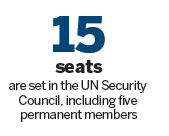New Zealand, Spain, Turkey vie for UN Security Council
Venezuela has taken the spotlight in this year's campaign for coveted seats on the UN Security Council, but the hottest race is between New Zealand, Spain and Turkey, who are each trying to win one of the two contested openings.
The three countries' foreign ministers are in New York City this week lobbying for votes.
The UN General Assembly's 193 member states will vote on Thursday to elect five new members to the UN's most powerful body, and Venezuela's government is virtually certain to win because it is unopposed for the single seat allocated to Latin America and the Caribbean.
Angola is the only candidate for an African seat, and Malaysia has no opposition for a single seat for Asia, so their victories are virtually assured.
Venezuela has gotten the headlines this year because its last attempt to get on the Security Council in 2006, an effort led by then-Venezuelan president Hugo Chavez, was torpedoed by the United States. But the US chose not to publicly oppose Venezuela's candidacy this year.

That means all eyes will be on New Zealand, Spain and Turkey, who are competing for two seats representing the Western group of nations.
The behind-the-scenes campaign by the three countries has been going on for the past year.
Diplomats from New Zealand, Spain and Turkey have traveled the globe and invited UN diplomats to visit their countries. This week, the campaign moved into the open, with all UN ambassadors invited to separate receptions on Monday night hosted by the foreign ministers of New Zealand and Spain, and to a reception by the Turkish foreign minister on Wednesday evening.
The verdict of seasoned diplomats is the vote is too close to call to predict the winners.
New Zealand's UN Ambassador, Jim McLay, told the AP he was "cautiously optimistic".
Turkey's UN Ambassador, Halit Cevik, called it "a very tight race", but said he is "strongly hopeful".
Spanish Foreign Minister Jose Manuel Garcia-Margallo told Monday's reception that all the candidates have "very solid credentials". But he stressed: "My country presents a great spirit of service to the international community and a very large participation and tradition in peace operations."
Security Council seats are highly coveted because they give countries a strong voice in matters dealing with international peace and security, including conflicts in Syria and the Central African Republic; sanctions against Teheran and Pyongyang; terrorist activities by groups such as Islamic State; and the UN's far-flung peacekeeping operations.
The 15-member council includes five permanent members with veto power - China, the US, Russia, Britain and France - and 10 nonpermanent members elected for two-year terms. Seats are allocated by region, and regional groups nominate candidates.
(China Daily 10/16/2014 page11)








